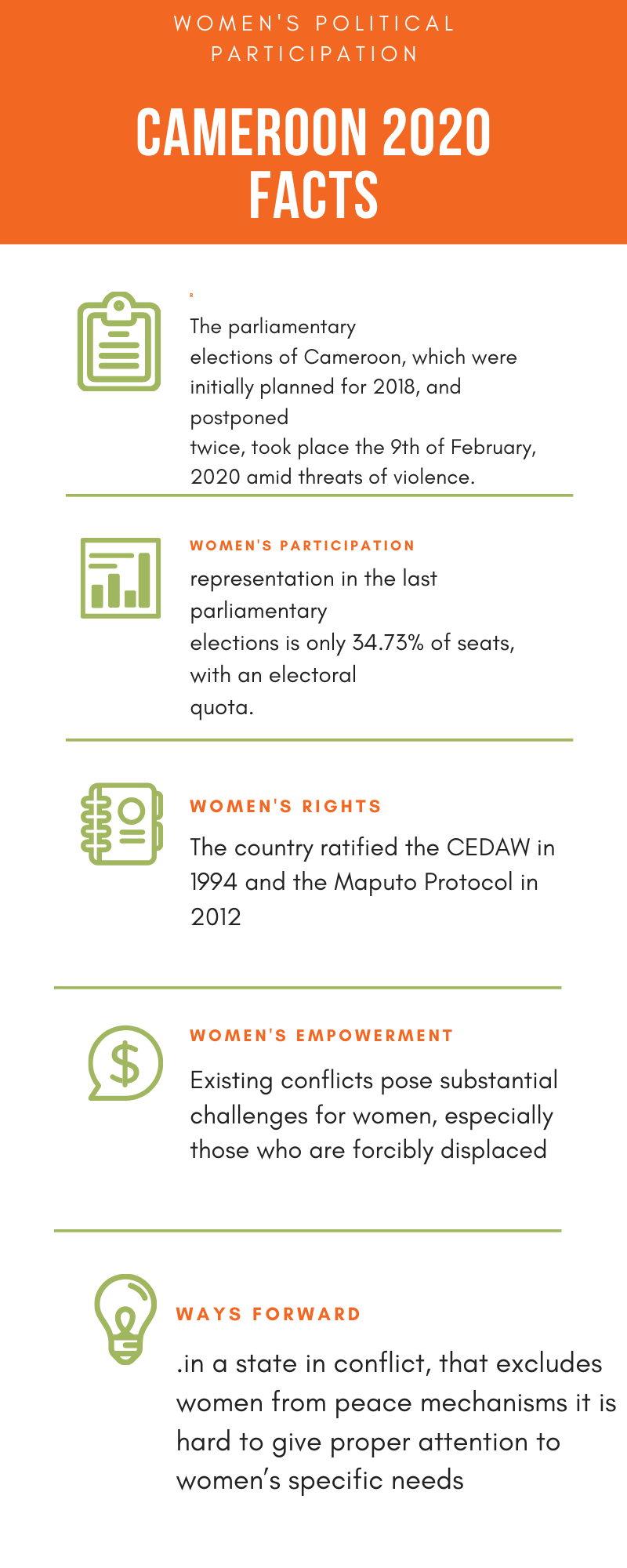Parliamentary elections in Cameroon took place on the 7th of October, 2018. Paul Biya, Cameroon’s president is now running his seventh term, continuing his 36 year rule over the Cameroonian nation.
Due to changes in constitutional amendment which removed term limits, Biya was able to run again for the presidential seat that he holds since 1982. Elections were accompanied by violence and low voting turnout, where 85 year old presiden won 71.3 percent of all votes. Among nine candidates, the nearest challenger Maurice Kamto of the MRC/CRM gained just 14.2%. There were no female candidates. Edith Kahbang Walla who stood in for the 2011 elections had resolved not to run if President Biya failed to resolve the crisis in the Anglophone regions. Turnout was 54%, far lower than in previous elections, and was just 10% in English-speaking regions, where rebels have been fighting a bitter battle for secession since their demands for English speakers to be appointed in courts and schools were brutally suppressed by the authorities.
Cameroon has a bicameral parliament consisting of the Senate and the National Assembly. The National Assembly has 180 members who are directly elected for a 5-year term.The President of Cameroon is elected by first-past-the-post voting; the candidate with the most votes is declared the winner with no requirement to achieve a majority. Cameroon is a unitary presidential republic, where the president is both head of state and head of government, and of a multi-party system. Executive power is exercised by the government and legislative power is vested in both the government and the National Assembly of Cameroon. The Board of the National Assembly is set up under the Constitution of the Republic and regulated by the Standing Orders and consists of 23 members.
Women’s Political Participation:
Women who constitute more than half of the population, are generally under-represented in the spheres of political and public decision-making and particularly in local councils and municipal executives with only 8% of local elected women and less than 2% of women leaders in political parties. The number of women in political positions in Cameroon is staggeringly increasing and more promotion efforts are required to add a new impetus. For example, UN Women’s strategic goal through its leadership and political participation program is to attain 50-50 participation of women and men in leadership and political positions in Cameroon by 2030.
In Cameroon, women gained the right to vote and to stand for election in 1946. Although the first woman was elected to Parliament in 1960, up until now, the country has not had a female President or a female Prime Minister. In 2010, only 11.8% of ministers were women. Nowadays, this number has slightly increased to 14%. In the current government, women hold diverse ministeries positions - Jacqueline Koung Bessike is a Cameroonian political figure who was the first Cameroonian woman secretary of state and since 2009 serves as Minister of State Property and Land Tenure. Hon. Minette Libom Li Likeng is a Minister of Post and Telecommunications, Hon. Madeleine TCHUENTE Ministry of Scientific Research and Innovation and Marie-Thérèse Abena Ondoa who is an academic, politician and Minister of Women's Empowerment and the Family since 2009. As it is highlighted by MEWC’s AWD report, for the 2013-18 electoral period, women occupied 26 council mayor positions, in comparison with 23 in 2007-13, 10 in 2002-07, two in 1992-97, and one in 1987-9297.
Since 2013 Lower or single House women hold 56 (31.1%) of the 180 seats. The Senate has 100 members of which 70 are indirectly elected by an electoral college composed of regional and municipal councillors using a mixed voting system. The remaining 30 members are appointed by the President. The members of Senate serve 5-year terms. Women hold 26 (26%) of the 100 seats in the Senate.
Cameroon has made key progress toward gender equality and women’s empowerment through major international commitments, including the Convention on the Elimination of All Forms of Discrimination Against Women (CEDAW), the Beijing Declaration and Platform for Action. Great role as well played the Declaration of Heads of State and Government of the African Union on Equality Between Women and Men and National Gender Policy implemented by the government. However, though these international and regional commitments take precedence over Cameroon’s national laws, customs, and traditions, the preference for customary laws remains, and means that discrimination against women continues in Cameroon, especially in rural areas. Female Genital Mutilation/Cutting (FGM/C) is still present as 20 percent of women are victims of female genital mutilation, and more than 1 out of 3 girls in Cameroon are married before they turn 18, but prevalence rates vary widely across regions: in the North 73% of girls marry as children, as opposed to 13% in the Littoral province.
Conclusion
Cameroon has seen steady increase in the number of women in political positions since the reintroduction of multiparty democracy in 1990, affected by great efforts put in place by government through the National Gender Policy whose implementation is piloted by the Ministry of Women's Empowerment and the Family. Over the period 2011 to 2020 the government focused on enhancing women's participation and representation in public life and decision making in order to systematic eliminate inequalities between women and men at all levels through advocacy.
Said that, gender quota must be ensured, and traditional leaders and electoral colleges must be urged to ensure that women comprise 30% of the delegates to elect the lower and upper houses as there are no legislated quotas at the national or sub-national level. Some political parties do include voluntary quotas to encourage women’s participation, which has witnessed a significant increase in women’s representation. Efforts must be made to build the capacity of women political candidates and aspirants and equip them with tools and skills to ensure their political participation. Furthermore, support in the form of capacity development must be granted to gender activists and civil society organizations.
